Key takeaways:
- Cannabis sustainability encompasses the entire product lifecycle, emphasizing responsible practices like composting, waste management, and local sourcing to benefit the environment and communities.
- Supporting sustainable growers not only promotes environmental stewardship but also empowers small farmers against corporate giants, fostering community connections.
- Current trends in cannabis retail include personalized shopping experiences, transparency in sourcing, and eco-friendly packaging, reflecting growing consumer demand for sustainability.
- The future of sustainable cannabis retail relies on innovation, community engagement, and circular economies, with brands adopting technologies and practices that minimize waste and enhance environmental responsibility.
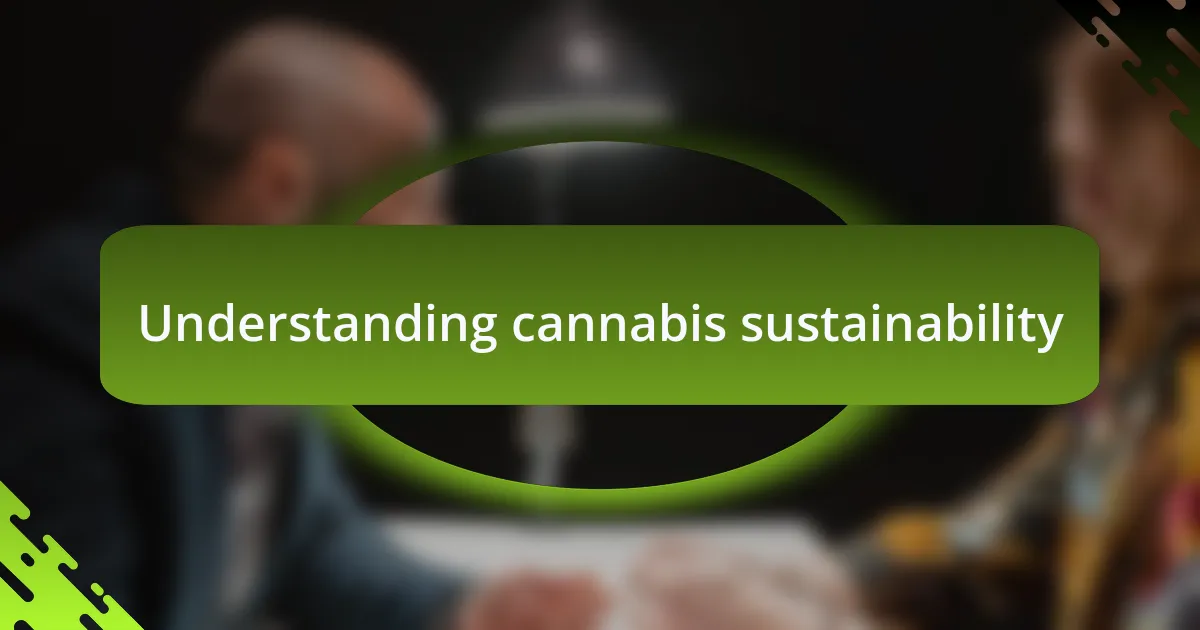
Understanding cannabis sustainability
Cannabis sustainability is about more than just growing plants; it encompasses the entire lifecycle of the product. For instance, I remember visiting a farm that prioritized composting and water conservation practices. Seeing how they transformed waste into vibrant soil not only amazed me but also deepened my understanding of how mindful cultivation can benefit both the earth and the final product.
Have you ever stopped to think about the resources that go into your cannabis? From energy consumption in indoor grow operations to the transportation emissions tied to product distribution, the footprint can be significant. Reflecting on these aspects, I realized that choosing sustainably sourced products isn’t just a trend; it’s a responsibility we all share in this industry.
Furthermore, when I think about the community aspect of cannabis sustainability, I recall an initiative in my area where local growers collaborated to share best practices. This not only fostered a sense of connection among us but also encouraged a culture of transparency and environmental stewardship. Isn’t it fascinating how collaboration can lead to significant positive changes?
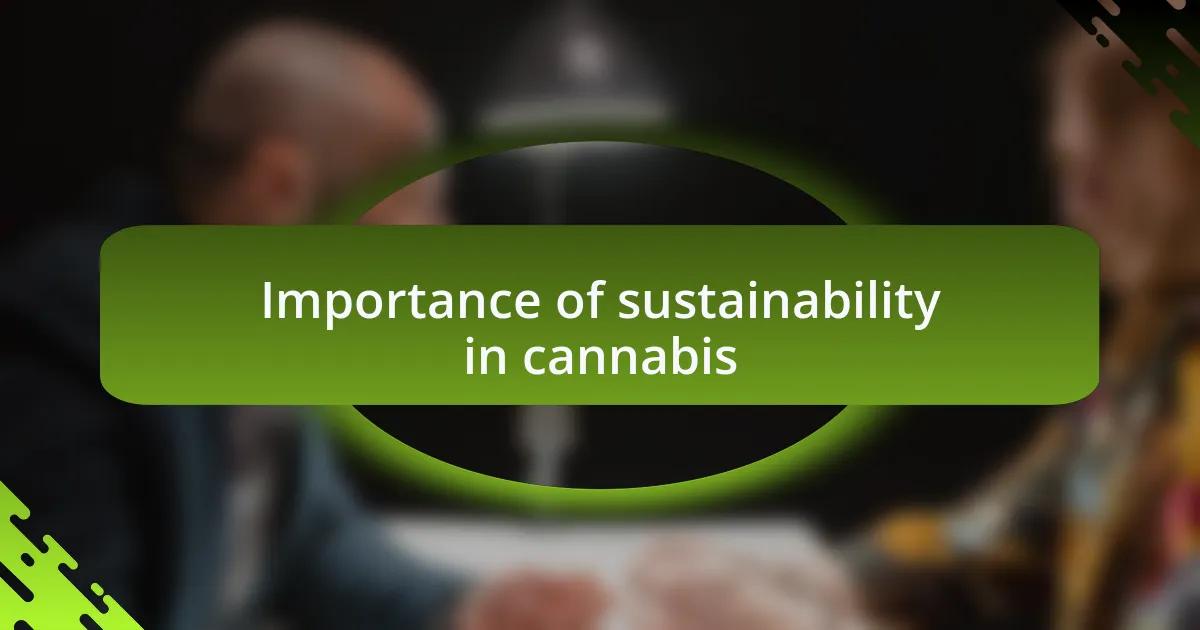
Importance of sustainability in cannabis
Sustainability in cannabis is vital for preserving our environment while ensuring high-quality products. I can’t help but recall my visit to an eco-friendly dispensary that sourced all its products from farms using regenerative practices. The passionate conversations I had with the staff about their commitment to minimizing waste really hit home for me—sustainability isn’t just a checkbox; it’s a core value that can elevate our industry’s integrity.
When I think about the importance of sustainability, I’m reminded of the small farmers I met at a local trade show who struggled against the might of corporate giants. They shared stories of their dedication to organic practices and the struggle to compete with less sustainable methods. It made me realize that supporting sustainable growers not only benefits the environment but also empowers communities that are often overlooked in favor of mass production.
A sustainable approach also cultivates trust among consumers. I remember browsing a product label that proudly displayed its sustainability certifications; it sparked a confidence in me as a buyer. Have you ever felt that sense of assurance when you know a company prioritizes ethical practices? Bearing witness to this shift in consumer expectations reinforces the idea that sustainability is becoming a crucial aspect of our industry’s future.
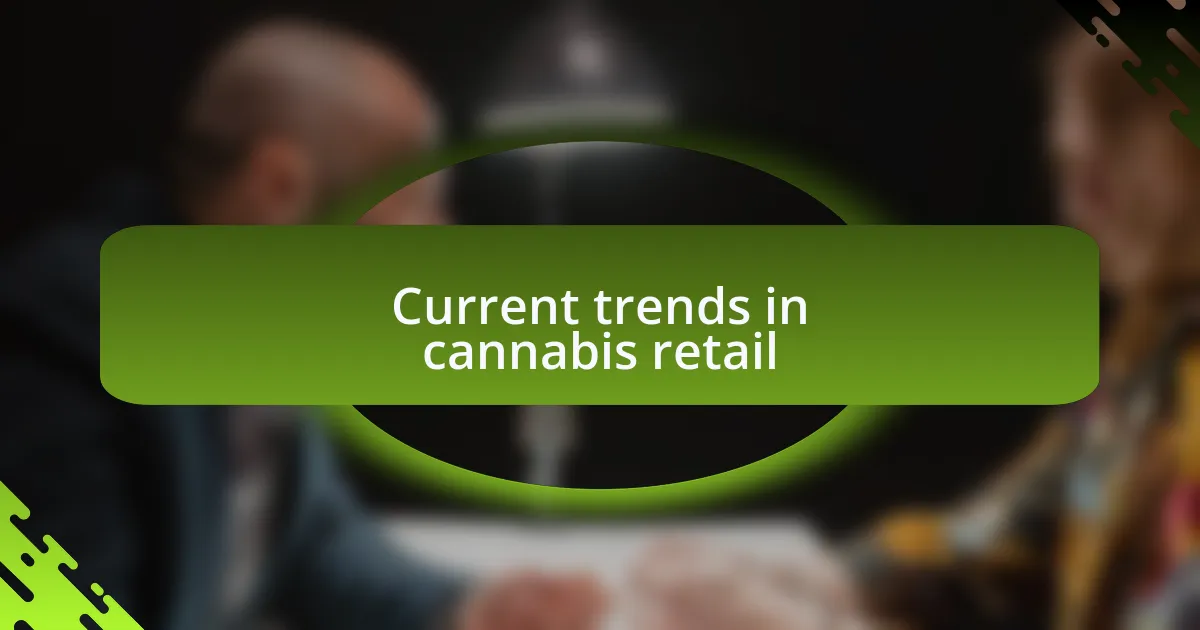
Current trends in cannabis retail
One notable trend in cannabis retail is the rise of personalized shopping experiences. I recall visiting a dispensary that utilized technology to analyze customer preferences, providing tailored recommendations that felt almost bespoke. This approach not only enhanced my shopping experience but also fostered a deeper connection with the products, making me appreciate the craft behind each strain.
Another significant development is the growing emphasis on transparency in sourcing. During a recent exploration of local retailers, I encountered brands proudly showcasing their supply chains, from seed to sale. Have you ever wondered about the journey of the cannabis you consume? This commitment to transparency has empowered consumers to make informed choices, ultimately bringing awareness to the importance of responsible cultivation practices.
Moreover, the push toward eco-friendly packaging is becoming increasingly prevalent in the cannabis sector. I noticed a local brand adopting fully compostable materials, which resonated with me as a consumer who values sustainability. Doesn’t it feel great to support a company that aligns with your values? As more retailers adopt such practices, it’s clear that environmental consciousness is becoming a defining characteristic of cannabis retail.

Practical steps for sustainable practices
One practical step for sustainable practices in cannabis retail is optimizing energy usage. I remember a friend who runs a dispensary sharing how they switched to energy-efficient LED lights in their growing operations. It’s not just about reducing costs; it evokes a sense of responsibility when businesses make choices that lessen their carbon footprint. Have you ever thought about how much energy is consumed in indoor grows? These small shifts can lead to substantial impacts in the long run.
Another approach is implementing a comprehensive waste management system. I once visited a facility that separated organic waste for composting, making sure nothing went to landfills unnecessarily. It struck me how simple it is to take this step, and yet, it reflects a deeper commitment to sustainability in every aspect of the business. Isn’t it inspiring when brands take such initiatives? When retailers actively manage waste, it showcases an understanding of their role in environmental stewardship.
Lastly, sourcing from local farmers is a game-changer in cultivating sustainability. I’ve seen dispensaries partner with nearby growers, offering products that are not only fresher but also reduce transportation emissions. It’s heartwarming to know that supporting local businesses contributes to a sustainable community. Have you ever tasted a product that felt connected to the land? That sense of place can create a bond between consumers and the environment that is rare in other sectors.
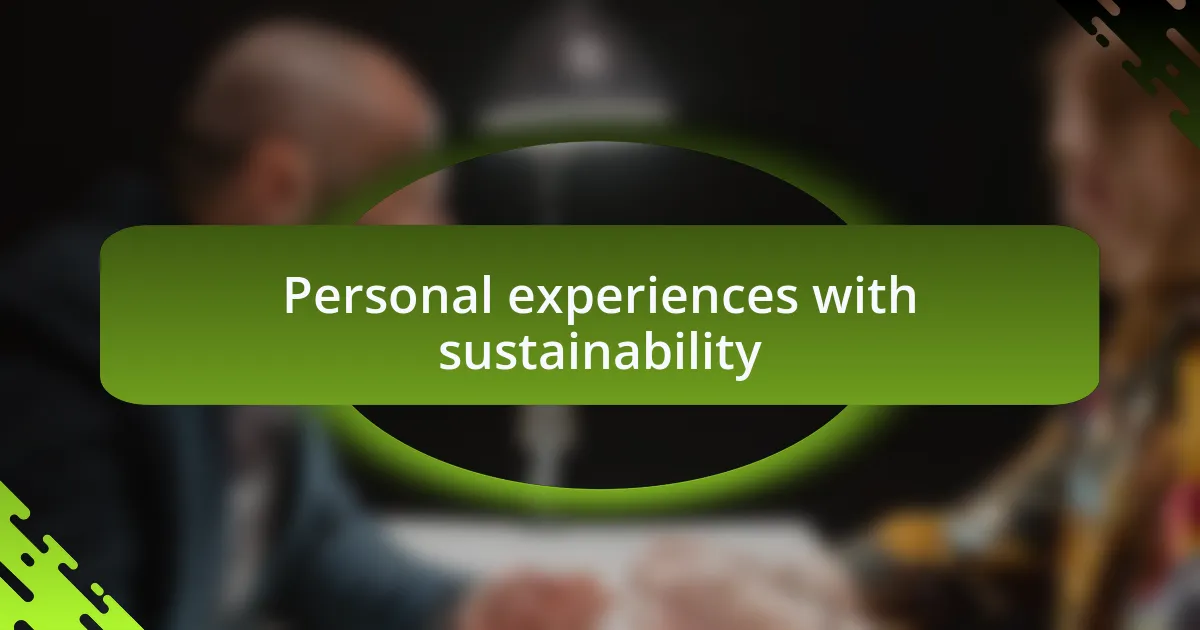
Personal experiences with sustainability
I’ve personally dabbled in urban gardening, using sustainable practices to grow my own cannabis at home. It’s fascinating how just shifting to organic fertilizers can enhance not only the plants’ health but also the quality of the smoke. Each time I harvest, I can’t help but feel a connection to the earth—have you ever felt that rewarding sense of accomplishment knowing your efforts are part of a greater ecosystem?
On another occasion, I volunteered at a local cannabis festival focused on eco-friendly products. I was amazed by how many vendors incorporated biodegradable packaging. This experience really opened my eyes to the importance of making conscious choices—not just in what we consume but also in how we present that product to customers. It made me wonder: how often do we think about the impact of packaging? The commitment to reduction and reuse can be as crucial as the product itself.
Additionally, I’ve tried experimenting with energy-saving techniques while nurturing my own plants. For instance, using a solar-powered grow light for my seedlings has not only cut down my energy bill but also evoked a sense of pride in being part of the renewable energy movement. Have you ever tried harnessing nature’s own power? The growth I’ve witnessed isn’t solely in my plants but in my understanding of what it means to be sustainable.
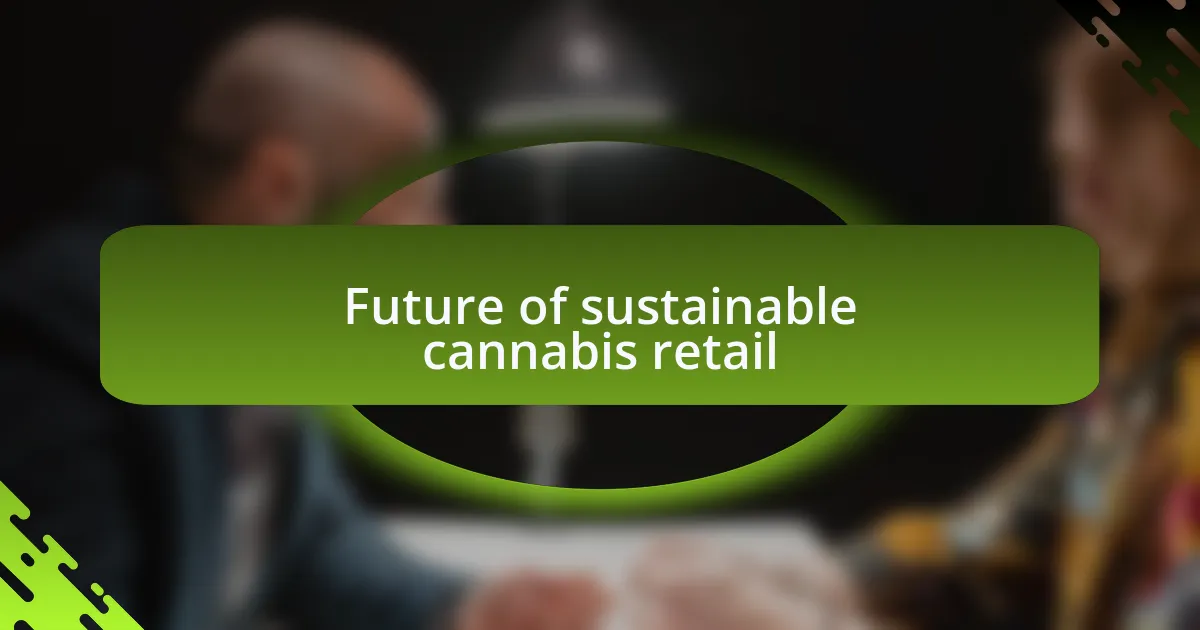
Future of sustainable cannabis retail
The future of sustainable cannabis retail hinges on innovation and community engagement. I recall visiting a forward-thinking dispensary that embraced a farm-to-table model, where they sourced their products directly from local, organic growers. Seeing how they fostered relationships within the community really struck me—how often do we consider that our purchases can directly support local economies and reduce carbon footprints?
As I look ahead, I envision a landscape where cannabis retailers adopt cutting-edge technologies to minimize waste. During a recent visit to a sustainable packaging seminar, I learned about edible packaging made from hemp. Imagine a world where not only the cannabis but also the packaging is environmentally friendly—what does that say about our commitment to the planet? The convergence of creativity and sustainability can transform the way we perceive cannabis retail.
Another thought that keeps coming to my mind is the shift toward circular economies within the industry. I often think back to my days in recycling programs, and it’s uplifting to see more brands excelling at product take-back initiatives. How can we encourage even more retailers to reclaim packaging and products? Embracing this model could lead to significant reductions in landfill waste and a more responsible consumer culture that reflects our values around sustainability.

Benefits of sustainable cannabis practices
One significant benefit of sustainable cannabis practices is the positive impact on the environment. I remember a conversation I had with a grower who had transitioned to organic farming methods. Their enthusiasm was palpable as they discussed how using natural fertilizers and pest management not only improved the quality of their cannabis but also enriched the soil. It made me wonder how many consumers realize that their choices can encourage healthier ecosystems.
Additionally, sustainable practices often lead to lower operating costs over time. Reflecting on my own experiences in energy-efficient businesses, I’ve seen firsthand how investing in renewable energy sources and water conservation techniques can drastically reduce overhead expenses. It’s intriguing to think about how these savings could potentially be passed on to consumers, making high-quality cannabis more accessible.
Moreover, embracing sustainability enhances brand reputation and customer loyalty. I once shopped at a dispensary that proudly showcased its eco-friendly initiatives, and I felt a stronger connection to their brand as a result. Isn’t it reassuring to support a business that not only prioritizes quality but also carries a commitment to the planet? This kind of integrity can differentiate brands in a competitive market and foster lasting relationships with consumers who share those values.